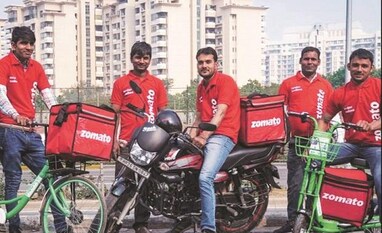Jaane waalo zara, mudke dekho mujhe, Ek insaan hun, main tumhari tarah
Gig Workers (Delivery Boys):
Gig workers are independent contractors, online platform employees, contract firm employees, on-call workers, and temporary workers. Gig workers enter into formal agreements with on-demand companies to provide services to the company’s clients.
In many countries, the legal classification of gig workers is still debated, with companies classifying their workers as “independent contractors”, while organized labor advocates are lobbying to classify them as “employees”, which would legally require companies to provide information on what types of gig workers they can classify. Full set of employee benefits such as time-and-a-half for overtime, paid sick time, employer-provided health care, bargaining rights unemployment insurance, etc.
Government estimates suggest that there are about 8 million gig workers in India, with the number projected to exceed 23 million by 2029-30. The work is very tough, low-paying, exhausting, and lacking safety.
Recently, a senior Zomato executive took an initiative at Ambience Mall, a busy shopping center in New Delhi, where he attempted to deliver a “fake” package. His experience was shocking. A security guard stopped him from taking the elevator to the third floor and pointed him to the stairs. Frustrated, he shared his thoughts on Instagram and called on Indian shopping centers to treat delivery agents more humanely.
His post, which included a video of her experience, sparked a wave of complaints from workers at various companies across India, highlighting widespread discriminatory treatment not only in shopping centers but also in gated communities.
An Amazon employee recounted his ordeal in the Saya housing complex in Ghaziabad, just outside Delhi:
“I was waiting near the elevator, and when it came down, others told me I couldn’t go. They said, “Use this one.” “I had to walk up to the fourth floor with a heavy bag.”
Gig workers have joined domestic helpers, cooks, nannies and drivers who are given “second-class treatment” by middle-class Indians, who like the services they provide but don’t care to share the same space.
Some gated communities have implemented policies that segregate service workers. Signs such as “Staff and service elevators” and “Residents and guests” are displayed at DLF Hamilton Court in Gurgaon. Public amenities such as lawns are banned and employees are discouraged from relaxing on park benches.
People want gig workers to do what they want, but they don’t want to see or hear them. A notice has been posted in Delhi’s New Friends Colony. Cycle rickshaws are banned in the neighbourhood, claiming they “diminish” the vibrancy of the area’s leafy streets.
Sumit, a 26-year-old delivery agent for grocery delivery service Blinkit, said he was made to feel “like a thief” while working in a gated community: “First, the guard at the gate wants to know where I am going,” he said. “Then the guard in the lobby area asks me to use the stairs, not the elevator. They make me feel like they are doing me a favor by letting me in when I am serving a customer.” Sumit recalled wanting to rest in a shopping centre full of benches, but the guards would always ask him to leave. Once, after a tiring delivery, he sat down on the steps of a gated complex only to be asked by a resident to stand up because he had made the place “dirty”.
Aparna Verma, a 40-year-old resident of Eldeco, a woman who works in a complex in Noida, expressed her disbelief, saying:
“I can’t understand the logic,” she said, noting that people allow service workers “into their homes to clean and cook, but they are not nice enough to sit on a park bench. They must be tired? More than cruel, it’s just stupid.”
I personally believe that every delivery agent should be treated more humanely and be allowed to use the same elevators and entrances as others. There should be no divisions whatsoever. Effective leadership can combat this kind of discrimination. If you put your foot down against discrimination and make it clear that discrimination is illegal and if you stick to your word, people will stand with you. Then, once you build a critical mass, it becomes easier.
I think what the rich are doing is that they are isolating themselves in their ‘bastions’ from the real India, from the common people living outside, who are trying to earn their livelihood. India is the most stratified and divided society in the world and even new sectors that are key components of the economy, such as gig workers, are not free from the same old attitudes that affect traditional workers like maids and cooks that divide us Indians.
Finally, I would like to quote an adage:
“Do unto others as you would expect others do unto you”.
Article written by and Editorial credit: State Bureau Chief Himanshu Nauriyal.
